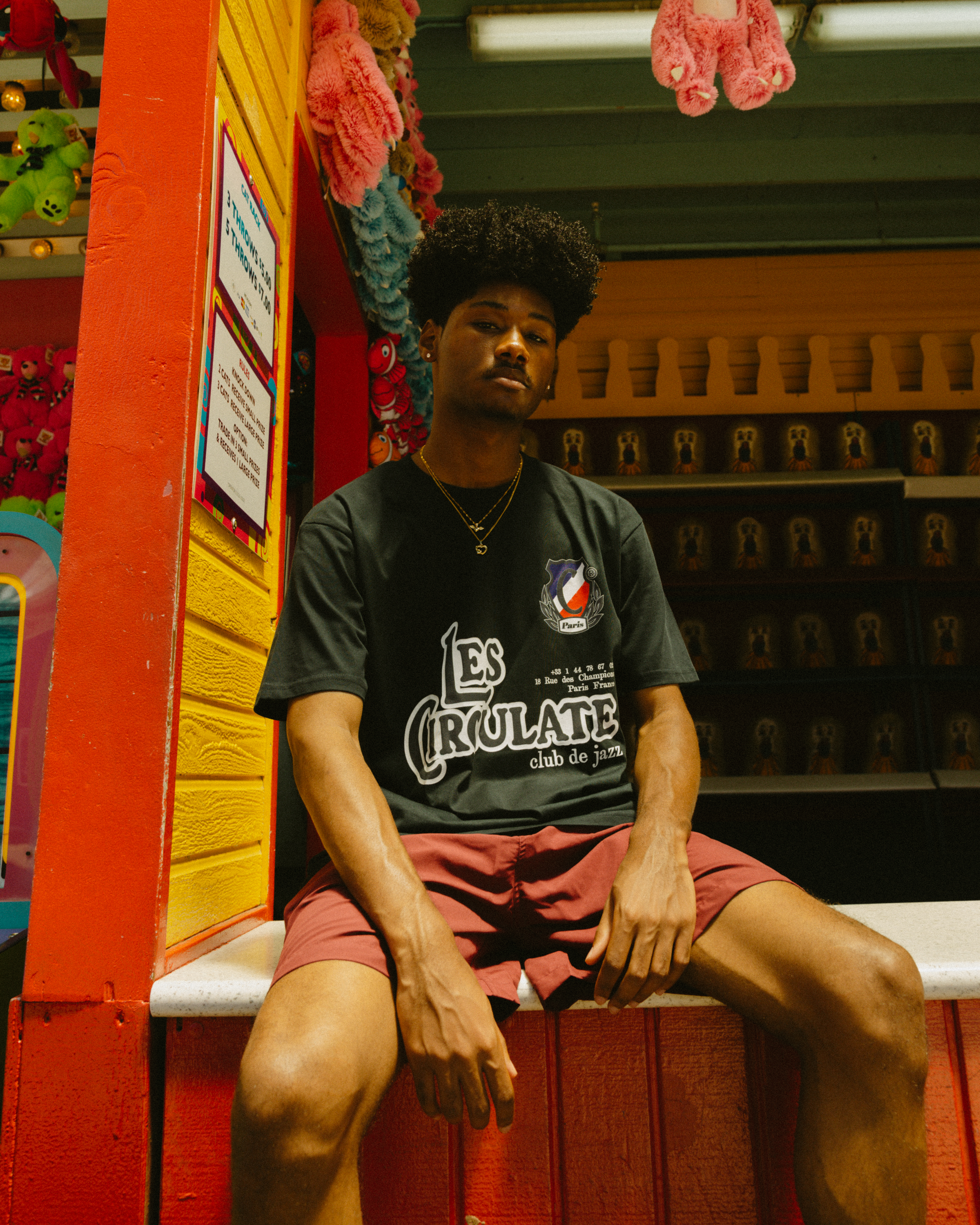
Corey Populus (aka Young Corey), founder and main creative force behind the brand Circulate, knows all about the grind. Before Circulate became a fixture of modern streetwear, linking up with the NFL and embarking on special collaborations nationwide through PacSun, it was a humble brand that grew out of Corey’s own passion for style. The artist put his time in — for over a decade, he solidified himself as a fixture of Los Angeles’ Fairfax Avenue, long before the spot was internationally known, working the registers and packing orders at places like Diamond Supply Co and spending his free time at The Hundreds. From there, Corey reached out to the friends he’d made along the way, like Diamond’s Nick Tershay, about how to start his brand, and taught himself how to make graphics on Photoshop via YouTube tutorials, eventually launching Circulate in 2018.
Then the pandemic hit. No single event in history has reshaped streetwear and the fashion industry as a whole quite like Covid-19. In the beginning months of the pandemic, the future of streetwear was up in the air as the entire industry had to rethink how to sell goods while retail spaces remained closed for the foreseeable future. For many brands, it was death, but for some, it opened up new paths that directly connected brands with their audiences, as community became a focal point of the industry. Circulate was one of the brands that benefitted from this new world, and in the past two years, Young Corey has been able to solidify the brand as a force to be reckoned with in streetwear.
The pandemic may not be over, but much of the world has returned to some form of normalcy. Through all of that, Young Corey still puts the importance of community at the center of everything. With Circulate’s continued success, he keeps his focus on finding ways to give back to the streetwear community as a whole, whether it’s passing on what he’s learned to a new crop of creators or continuing to platform other Black-owned brands.
We chopped it up with Young Corey to get his thoughts on what streetwear is doing right, what it can do better, and where he plans to take the brand into the future.
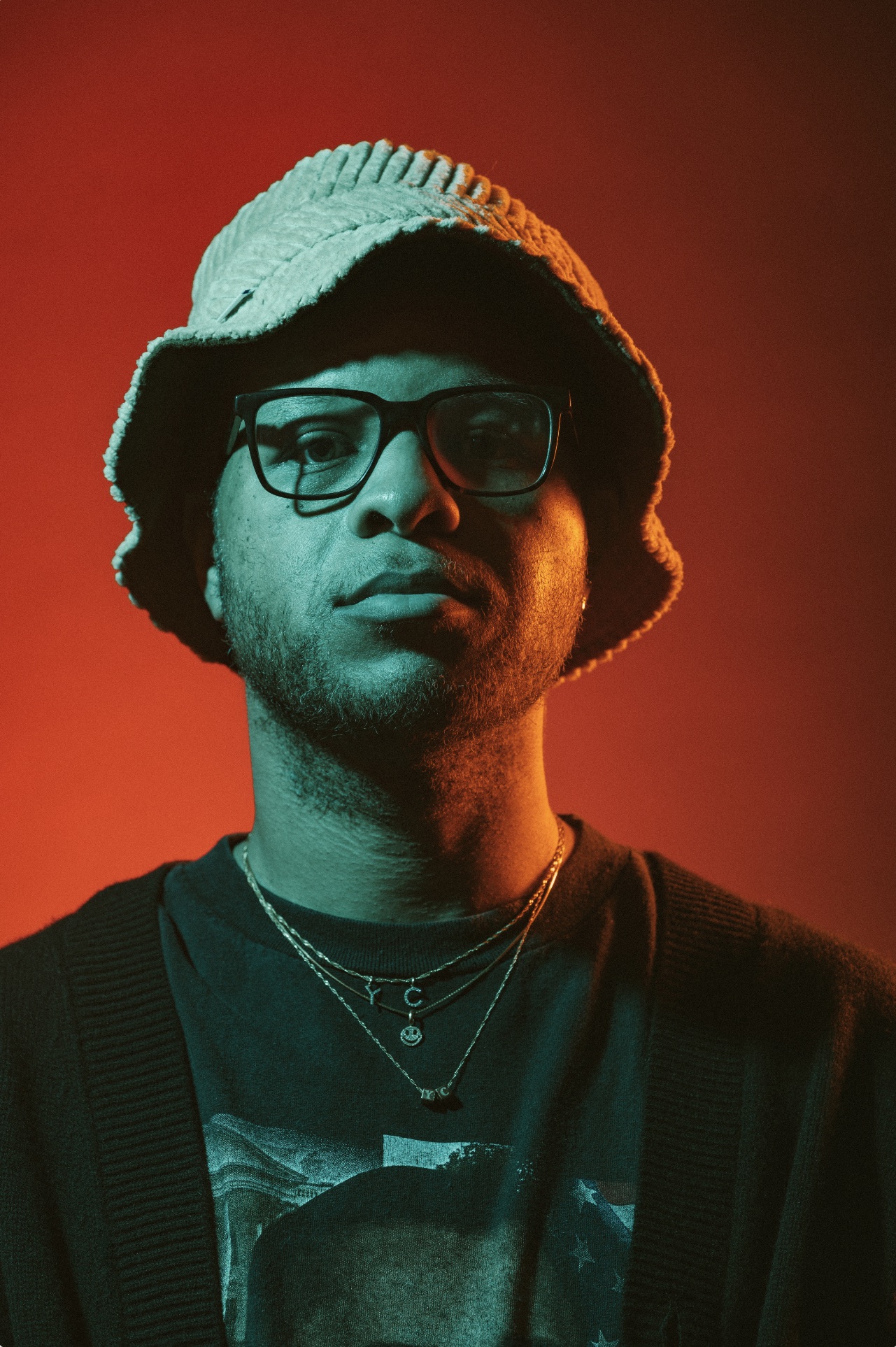
Over the past two years, COVID has had a huge impact on the fashion industry. Now we’re seeing a lot of direct-to-consumer sales tactics and similar to what’s going on with work-from-home business models — it doesn’t look like that’s going to change. I know Circulate’s first years were right before the start of the pandemic, what major things did the last two years reveal to you as the head of a brand?
To be completely transparent, for me, the pandemic offered a lot of opportunities for the brand to grow.
Through the pandemic, a lot of brands grew their DTC (direct-to-consumer) business because a lot of retailers closed down. Unfortunately, I think a lot of people, especially brands that rely on retailers to sell their gear and don’t have an online e-comm fan base, got hurt throughout the pandemic. But I think it helped people to notice the importance of direct-to-consumer.
I think especially too, in this day and age, most of the newer brands, they’re not on the old model of streetwear where everyone had to rely on a retailer to get your name out there and you had to have international retailers to get your name out overseas and things like that. I think most of the newer streetwear brands have built these massive cult followings through social media because we have access to that now. It has allowed us to essentially cut out the middle man of retail where a kid would have to go into a shop and find out about your brand through that shop, as opposed to now where kids can just follow your Instagram and they can stay in the loop about what you’re doing and what you’re dropping and become fans of the brand through that.
Circulate took off during the Black Lives Matter protests. How did those events help you find your voice and the identity of the brand?
I was already making a bunch of cultural graphics and things that tie back to being a black-owned brand before that all happened. But after George Floyd, I started to see how people were using their brand platform to spread awareness about what was going on. We were still such a young brand during that time, I think I was two years deep and I was still trying to get my footing and figure it out, and I felt like I was going to get some steam next. And the pandemic hit and when it first hit, it kind of just was like, “Oh, damn. Where do I go from here? How do I pivot from this?” Then those protests happened, but I want to say six months to a year prior, I had dropped a bunch of t-shirt graphics after I had visited the African American History Museum in Washington DC. I got super inspired by that and I dropped a bunch of designs. They didn’t really do well because we didn’t have the fan base to move a lot of units. Some of the graphics, I couldn’t give away for the life of me, you know what I mean? When the George Floyd protests happened I was just like, “Oh, damn. I have a few shirts that applied to what’s going on outside now.” And I posted one on my Twitter and I said something along the lines of, “Damn, this shirt, it’s perfect for what’s going on right now. I wish I had some more,” and someone replied and was like, “Why don’t you just make more?”
So I put up a pre-sale link for the shirt that I call “Power” and on the front, it has the Circulate logo and then the back, it has a picture of Angela Davis and a couple of other Black Panthers and it says, “All power to the people,” so it reads, “Circulate all power to the people.” I mentioned that I would donate the proceeds to a charity that was doing the work on the ground and it just kind of exploded from there. I think I sold over five or six hundred shirts and I was able to donate a large amount of money all these people started reaching out to me to do interviews and just spread awareness about my brand and what I was doing.
Out of nowhere, I started getting all these new fans of the brand and stuff that was sitting on the site forever started to move and I just gained a whole new fan base. Then I started to think about, What are the things that it takes to make a brand successful? One of them, in my heart, I feel is consistency. So I went back into a bunch of stuff that I already had dropped and I started re-dropping something every week that was new that related to what was going on, and started making new graphics when I ran out of older stuff to drop. I just grew the brand from there and it helped out a lot, man.
I also thought it was super important because now there are a lot of black-owned streetwear brands but it’s super important that people are supporting these brands because back in the day there weren’t as many to choose from. I think it’s really dope how there’s so much diversity in streetwear now.
Do you find that politics and social messaging are a key part of the brand now?
Not necessarily politics, I don’t want to box myself into being a brand that’s making only political graphics or only black graphics, or only music graphics. I want this brand to be something for everybody. Some of those things are essential to the brand, but it’s not going to be the end all, be all of the brand. I have this aspect of the brand called Re-circulate. It’s just a section of Circulate that’s all about sustainability and taking care of the planet and just how much waste some of these fast fashion brands bring to the clothing space. Then I have another piece of the brand where I do a bunch of musical stuff called Circulations.
Then there’s another piece of the brand that I do with PacSun, it’s called Circulate Market. And I use it as a platform to highlight different black-owned streetwear brands that I think are cool and just allow them to sell their stuff at PacSun. We do a pop-up shop and we kind of just come together and show the strength in numbers and we also do a charitable component of that. It’s a big give back for me, whether it be a charity or grabbing a younger brand that I think is cool and just giving them a big platform. Then there’s Circulate Arts, which is all the stuff that you see where I’m teaching about something. From the stuff I did with the NFL, teaching about guys like Kenny Washington and other black cultural figures and stories or lessons that I want to teach people about that the average person wouldn’t know about.
There are like three or four different parts of the brand because I don’t want to box myself in where someone can say, “Oh hey, that’s Corey’s brand. It’s just about black people.” Of course, I do stuff about black people to raise awareness and teach people about history, but I don’t want to just be that. I’m more than that. At the end of the day, I collect sneakers, I’m a skateboarder, I love streetwear and I love rap music and I game.
I don’t want to just be Corey the black guy. I do a lot of different stuff.
Outside of being a Black creator yourself, why is it so vital for streetwear to highlight black creators? I think streetwear should make sure that it properly platform black creators because that is the root of the style.
To be honest, man, I think there are two sides to it. A lot of inspiration comes from Black culture and streetwear. You look at hip-hop, and different tastemakers over history, nine times out of ten, a lot of them are black. The reason I created Circulate Market was that a lot of those Black streetwear lists that were coming out in support of the Black business movement, it was always the same people over and over again. Don’t get me wrong. A lot of those people that were on the list, they’re my friends and they kill it and crush it. But I just felt like that there are more brands out there that deserve recognition for being Black-owned businesses that are doing equally as good and putting in the work.
My idea behind Circulate Market was to recognize those brands and people, I brought the idea to PacSun and they loved it and we did the first one and it was successful and now it’s become cemented into the brand and it’s just something that I want to do throughout the lifespan of this brand. It’s just a good feeling at the end of the day. Not all of the brands that I choose are smaller brands, but when I do choose the smaller brands and give them a platform to sell at anywhere from 85 to 114 PacSuns across the US, that’s a pretty big deal for some of these guys.
Then on the flip side of that, when you’re selling to a big box retailer PacSun, it’s not just like, “Oh, let me print some t-shirts and send them to PacSun.” It’s a whole process from production and distribution. So I get an opportunity to teach someone that isn’t familiar with that process. I’m giving back to them. And then they’re also being put on such a big platform by being in all these stores, so that’s a great feeling for them. And there is a charitable aspect to it too.
For this last one that I did, I donated to a charity called Cleanup South Central and their goal was to help rebuild the computer lab at the founder’s old high school. Doing things like that, opening up doors for future creators to have a computer lab and maybe they have Adobe Suite downloaded on all those computers and they could become the next me. It’s a great feeling knowing that I had some tiny piece in pushing that agenda for them.
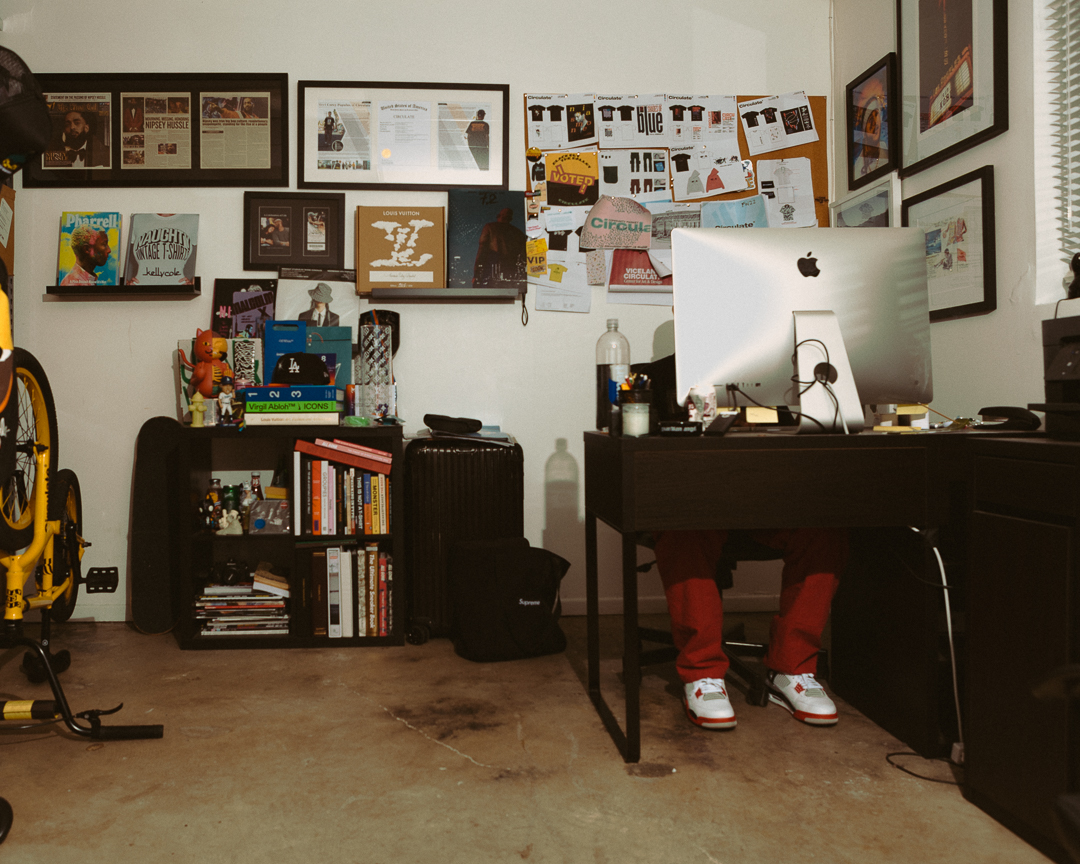
I think that speaks to your origins as well. That’s something that you could have benefited from in your earlier days.
Yeah. Honestly, the way that I think and the reason, the way that I am, is because I always wished there was someone out there like me when I was starting. I grew up in a generation where there were so many more gatekeepers. I think having access to things is a big deal because if you give someone access that could change the landscape of their life, how they think and how they grow. When I was younger and growing up, I wasn’t rich and my mom did a great job of making sure I had the things that I needed, the necessities. But I went to school in a different neighborhood than I lived in, in a nicer neighborhood and I have friends that are rich and they live by the beach and things like that.
Having access to that and going to their houses and seeing how they’re living and experiencing different things was huge, my friend had a computer and that was a big deal, I think that changed the way that I thought and that was just super vital to my life. Seeing nicer things and having access to more information and just a different way of living than I was. That’s kind of my mission with the brand. I see Circulate more as a design firm. When you think about design, design is used to fix things and that’s where I see myself with the brand, I know it’s a big thing now and everyone’s like, “Oh, community this and community that.” But I just do it because it’s second nature and I wish I had someone in my position helping me when I was growing up.
I just want to open certain kids’ eyes, that don’t have the same opportunities, from one side of town as the other side of town.
I want to give those kids access because if they can see what I’m doing and how the trajectory of my life has changed from when I was them, maybe they can get some type of hope or inspiration. You don’t have to go to college to be successful in 2022, you don’t have to be a basketball player or a rapper or whatever the typical stereotypes are. You can own your own brand and do whatever you want and not have a college degree and be successful.
It just takes the right tools or having the access to the right tools and information to achieve your goals.
How do you see streetwear evolving into the future? It seems like brands are less rigid about what streetwear actually is these days. There’s a lot of co-mingling with luxury brands for example. Is that a bad thing? Is it better that the umbrella of streetwear has become so wide?
I think it’s pretty cool, man. I know, in the beginning, streetwear was rebellious, it was supposed to be different from high-end fashion and all that stuff. But when you have people like Virgil Abloh who break that barrier and bridge the gap between the two, I think it’s great because, at the end of the day, high-end luxury has been borrowing from streetwear since the beginning of time, streetwear and skateboarding, so for them to give us recognition on a new platform, it’s a cool thing to see. I didn’t ever grow up a fashion kid, obviously, I know about the big players like Louis Vuitton and Gucci and Prada and things like that, but I wasn’t familiar beyond bags and things like that.
I was a streetwear kid to the bone. I skateboarded and I wore Stussy, The Hundreds, and things like that. I think what Virgil did was super important by breaking down that barrier of entry. It helped me feel more comfortable attending things like Fashion Week and learning more about luxury brands. Now things like Fashion Week don’t have so much gatekeeping against the people that they’re getting inspired by. So you go to those shows and you see a bunch of people that, back in the day, wouldn’t even be invited to those shows.
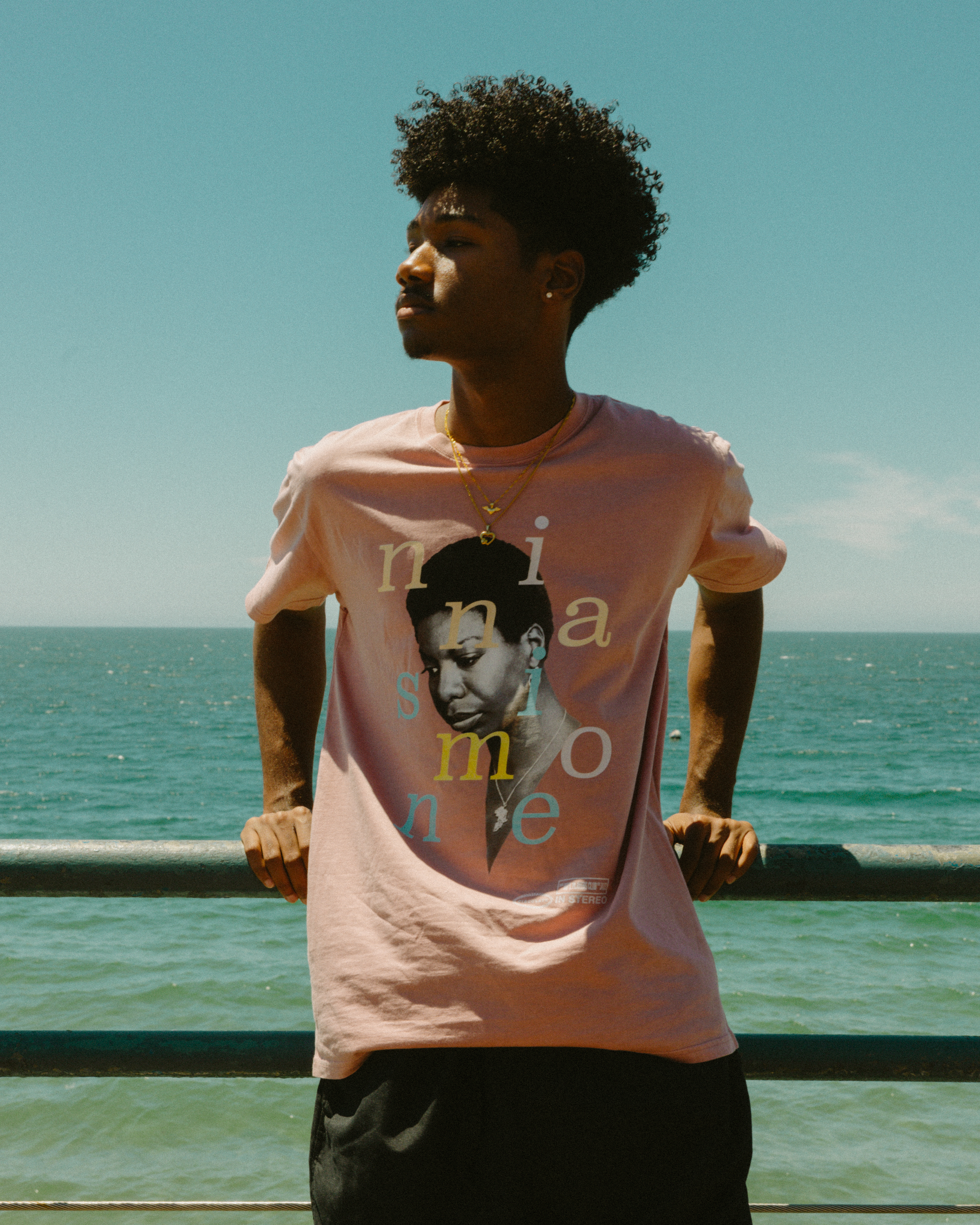
Right, the gate’s open now.
Exactly.
I wanted to ask you about Virgil Abloh. His death was a major loss for streetwear and fashion as a whole. What are important lessons to take from him to help keep his spirit alive in the industry?
Man, Virgil, I want to say to me, was probably my biggest inspiration just because of the way I related to him. Someone that’s so multifaceted across different mediums, I have friends that are skateboarders, I have friends that are rappers, I have friends that are the best gamers or I have friends that are the best in fashion, and I know he was the same. He knew architects, he knew rappers, he knew fashion people. He also was just into a lot of the stuff that I was into. He loved skateboarding and sneakers. The way that he carried himself just as a human being, he was just the kindest guy ever and made time for anyone from fam to fan.
I think that’s super important, just to have that connection to people. One of the biggest lessons that I’ve seen from him is that he got things done by any means necessary. You’ve never seen him complaining about the gazillion things that he was working on. He just got them done and kept it moving. I think that’s just inspiring in itself. Seeing him reach such a high level at Louis Vuitton, coming from being a streetwear kid was so inspiring. That doesn’t happen all the time. The crazy part about it is, he kind of opened up the floodgates for more people like himself to take those positions.
I think he’s just one of the greatest to ever walk to earth. Just such a humble guy and I think that’s something that I carry with me, taking the time to talk and respond to everyone that hits me up. Connecting with people is important.
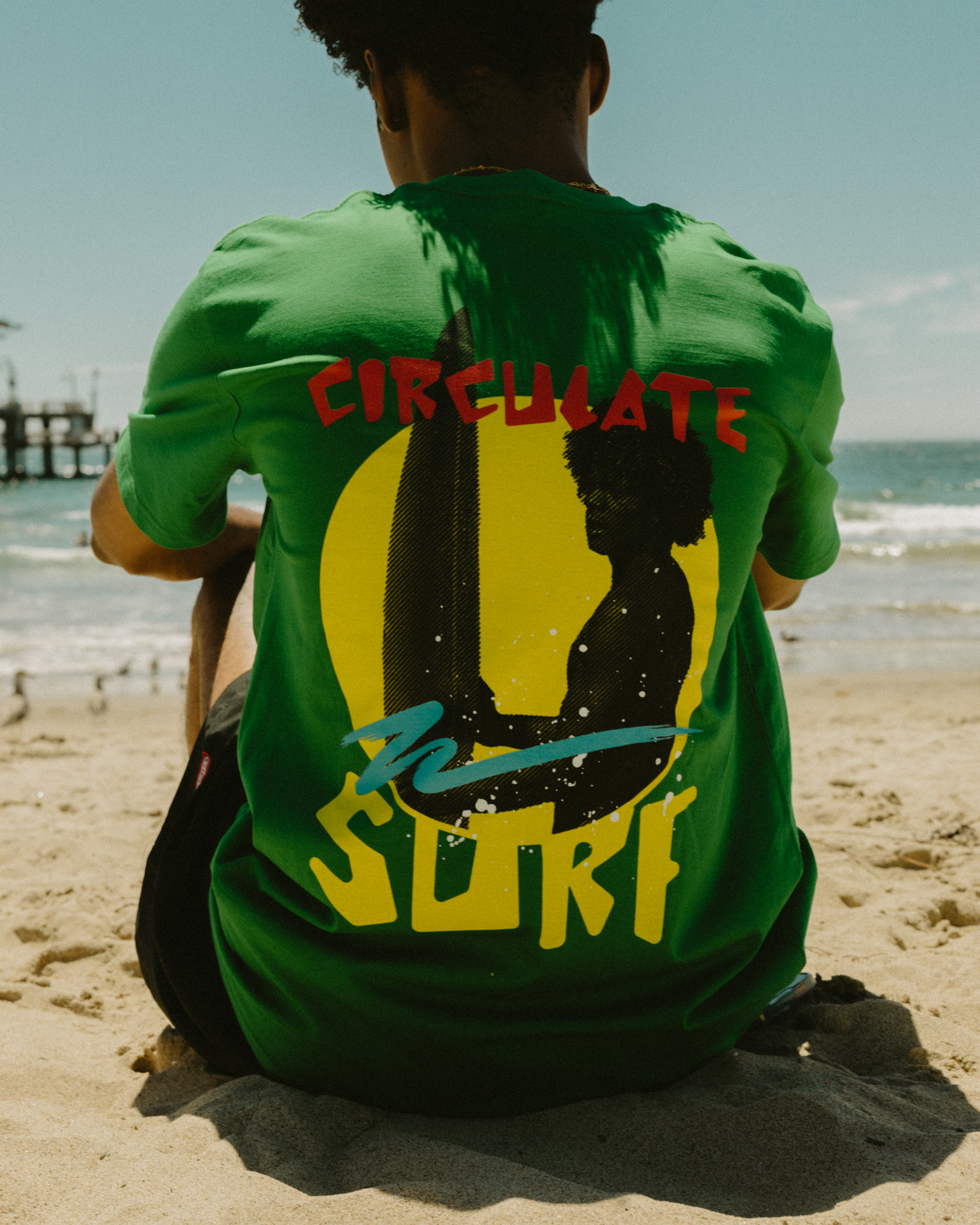
Community is obviously very vital to streetwear. Why is it so important to build good strong communities around brands?
It’s important to build a community around brands because at the end of the day, these are the people that support you and they want to feel a part of your family. Kids hit me up all the time and ask me what advice I have for them when they’re starting the brand. The number one thing that I always say to them is just get out there and move around and network because you’re building your community and you’re spreading the word of your brand. At the end of the day, the bigger your community, the more support you’re going to receive. I think the internet only goes so far with how many people you can reach and talk to. I think being in person and being present and connecting with people IRL is more important. Because if this whole internet thing blows up tomorrow, it’s like — are you certified in the streets?
You mentioned sustainability, obviously, sustainability is super important, especially in regard to the fashion industry because it is so incredibly wasteful. But, a lot of times it feels like sustainability has become a marketing ploy for some brands. What is possible and isn’t possible right now and what’s the direction you see things moving in?
Honestly, man, I think a huge part of sustainability is buying vintage. It kind of sucks because I’m sure a lot of the original people that were collecting vintage and stuff, they’re seeing obviously, the prices are out of this world. But buying vintage is helping do your part. I do think in the future a lot of people might turn to using sustainable blanks, whether it’s sustainable cotton or vintage blanks. I think that’s a step in the right direction.
But I don’t think streetwear is the problem because I think now in 2022, a lot of brands, they’re using the pre-sale model, they’re putting something up for an allotted amount of time and they’re pre-selling it to you, and then making it to order.
As opposed to a brand like Shein or Fashion Nova, they’re just pumping out gazillions of units so they get it at a lower price and can retail it at a lower price. When those things aren’t selling, they’re just going to dump them in giant landfills. I read an article mentioning about how Shein produces over 10,000 units every hour or something like that, that just sounds absurd. That’s just one style!
Think about all the people that don’t shop at Shein and they’re just wasting a gazillion units every day and dumping them in a landfill. I think that’s more so the problem, fast fashion, as opposed to streetwear. Granted, there are a lot of people nowadays who just start these brands and are producing clothes because they just think it’s a cool thing to do. But I don’t think we are a part of the major problem.
Just to close out, obviously Circulate has seen a lot of success over these last two years, allowing the brand to do a lot more, maybe even more than you initially envisioned. So I’m curious, what things do you want to do with Circulate heading into the future? What’s the frontier the brand hasn’t explored yet?
To be honest, for the last two years I’ve been trying to do my own sneaker. I really want to work with Nike or Jordan Brand and those things don’t happen overnight. I would say my biggest goal for the last year or two is just to get my own sneaker or sneaker deal. You can’t really do anything about it, it’s more of like they pick you. I think I just have to keep doing the work that I’m doing and hope for the best because I feel like I’m doing a good job and I’m sure someone’s watching.
That’s my biggest goal. Sneakers brought me into streetwear, so obviously doing my own shoe would be a huge deal and that’s my biggest goal. I’ve gotten to cross off a lot of things this year. But having the opportunity to work on my own shoe, even if it’s just a friends and family shoe with Nike or Jordan Brand would be a huge milestone for me and then I would honestly have to find some new goals.
I’m working hard towards it. I’m kind of not really stressing out too much about it anymore. If it happens, it happens. But yeah, that would be the biggest one for me.
